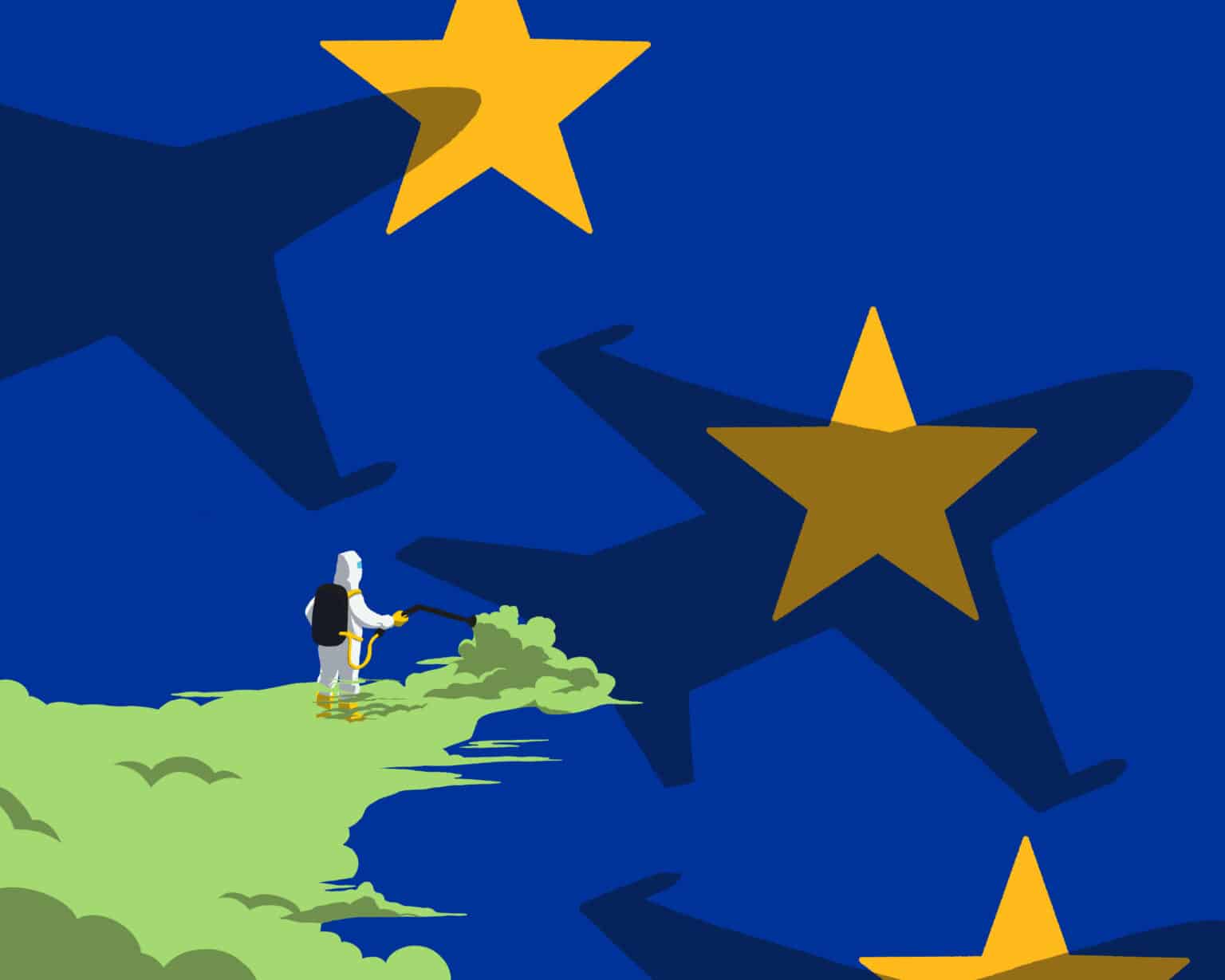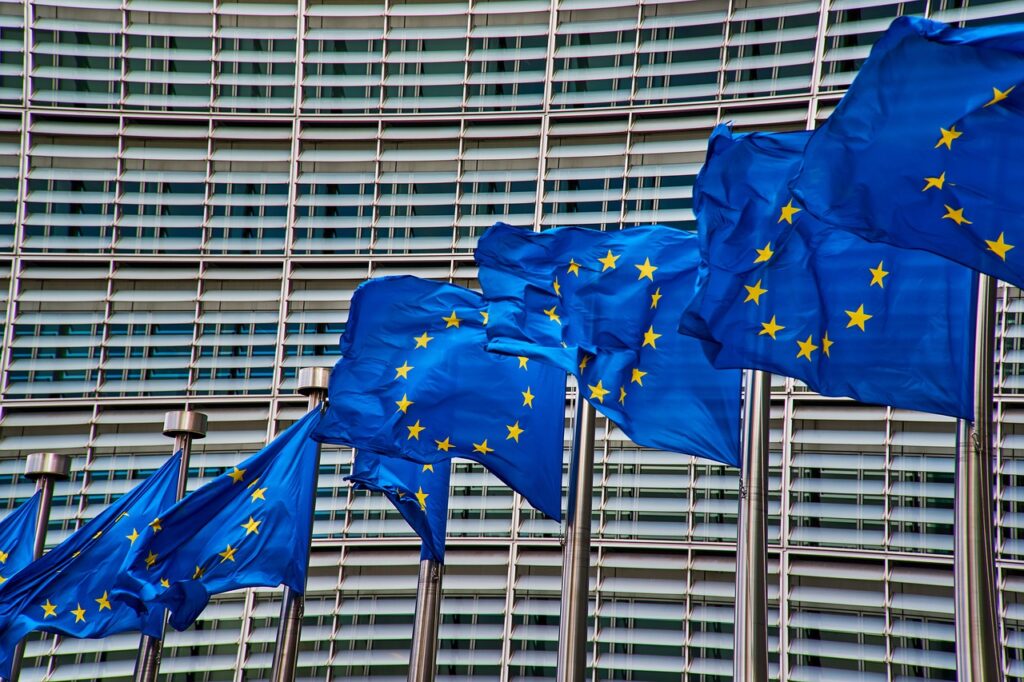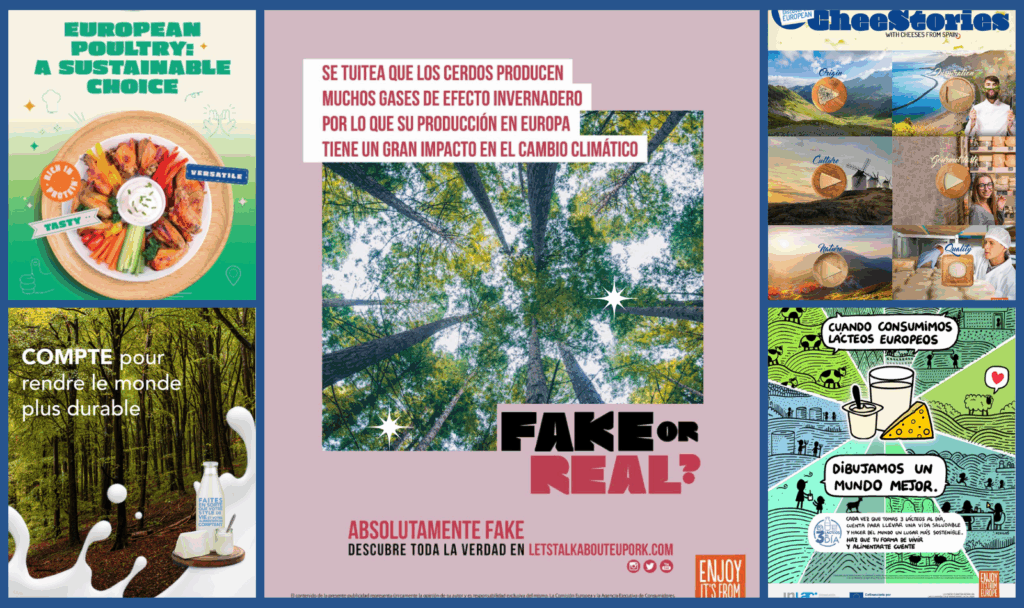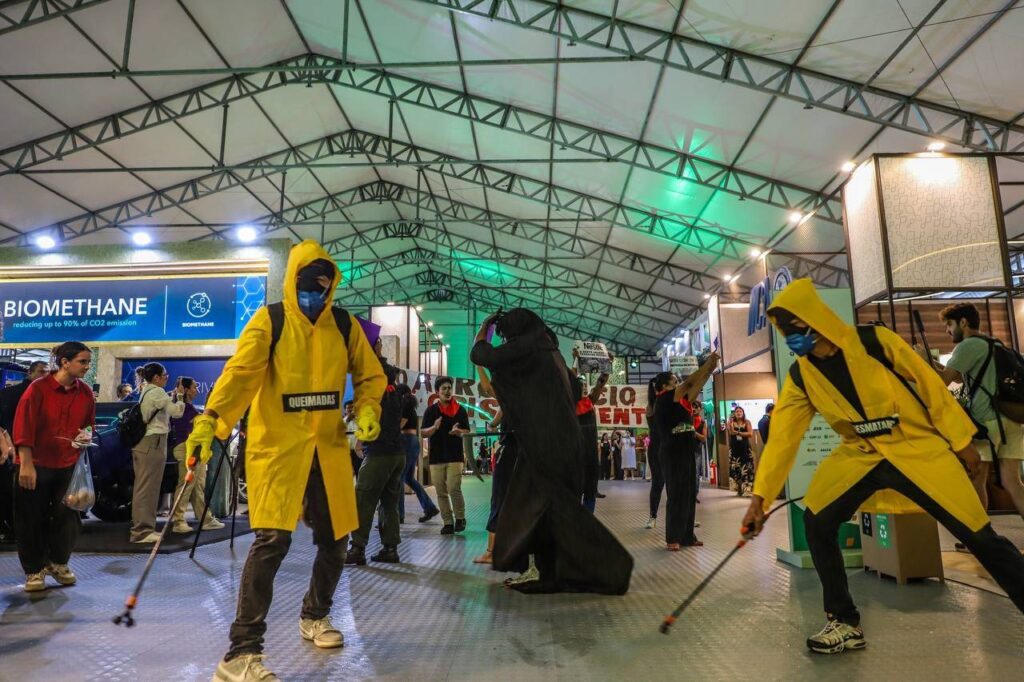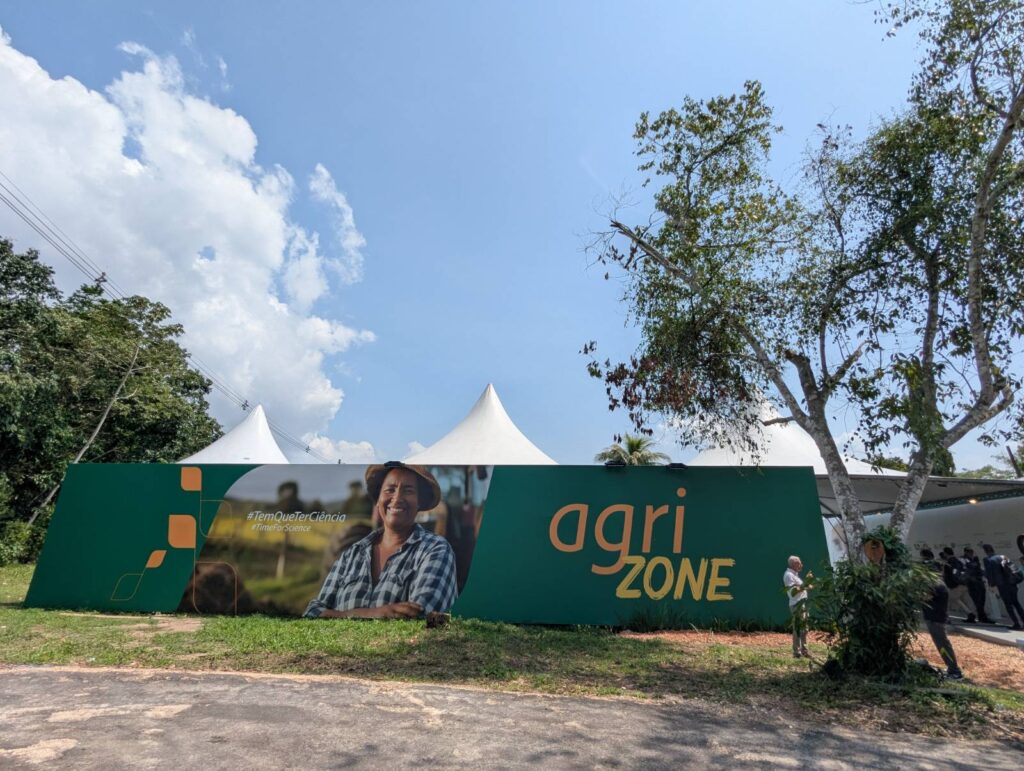Europe’s leading farming lobby group Copa-Cogeca has used the war in Ukraine as a pretext to push back behind the scenes against bold EU laws to protect nature, DeSmog can reveal.
The meeting records reviewed by DeSmog are the latest evidence to emerge of a long-running effort by agribusiness lobby groups and pesticide firms to roll back rules aimed at safeguarding birds, bees, and butterflies.
The findings come as campaigners warn bold proposals to slash pesticide use are in jeopardy. EU policymakers are poised to water down or delay green proposals in the coming weeks after coming under “incredible pressure” from industry.
Documents obtained by DeSmog show Copa-Cogeca, a powerful trade body for Europe’s farmers, demanded revisions to the EU’s sustainable farming plan at a private meeting with the European Commission in the wake of Russia’s invasion of Ukraine.
DeSmog has also learned that Copa-Cogeca and pesticide lobby groups have enjoyed privileged access to European decision makers through membership of an expert food security group, where industry participants called for delays to the EU’s green farming strategy.
Alongside Copa-Cogeca’s pushback behind closed doors, the lobby group has led a public campaign against green farming plans in the form of joint letters, consultation responses, and press releases, documented by Influence Map.
Its October report found several examples of long-standing policy asks — which would weaken environmental protections — being re-purposed in light of Ukraine, in the name of food security.
Campaign groups say these food scarcity narratives are cynical — and familiar.
“The hunger narrative is really instrumentalised in these moments,” says Annemarie Botzki from Foodwatch International. “We need to look at the interests behind that. Our current food system is dependent on fossil fuels, fertilizers, and pesticides — it’s a very lucrative business model.”
With biodiversity in sharp decline across the world, and numbers of birds and pollinators plummeting in Europe, green groups are deeply concerned at the prospect of any further delays.
“One species of insect is going extinct every hour and we know synthetic pesticides and agriculture are the main driver,” says Salomé Roynel from the Pesticides Action Network. “If insects disappear, the food supply disappears. We cannot wait any longer.”
Green Targets at Risk
Agrochemicals (fertilizers and pesticides) are a lynchpin of the European Union’s carbon-intensive agriculture sector, which is responsible for over 10 percent of the EU’s greenhouse gas emissions.
Due to this and other harms — such as wide-scale damage to ecosystems and human health — the EU has made limiting pesticide use a key plank of sustainable farming measures included in its Green Deal, a historic package by the bloc to reduce its emissions in line with global climate targets.
Brussels has come under intense pressure from agribusiness ever since.
The EU has already eased up on some of its green agriculture rules — allowing farmers to grow crops on land that was to be set aside for nature — after lobbying from Copa-Cogeca and others.
Now there are signs the EU’s bold pesticide targets may be de-railed. Several EU states are set on re-assessing a promise to slash pesticide use 50 percent by 2030, a target laid out in a draft regulation (SUR) by the EU Commission in June.
A document leaked to Politico Europe in November revealed the EU is already prepared to concede ground, with the suggestion it will re-consider a total ban on pesticide use in ecologically sensitive areas.
In the same month, Copa-Cogeca, pesticides lobby group CropLife Europe, and others published an open letter calling for a new “impact assessment” on SUR in the light of the Ukraine war despite seven pre-existing studies.
With up to 20 member states now said to be calling for a reassessment, Brussels is expected to acquiese on 19 December. This will effectively stall negotiations over pesticide-reduction targets until further notice.
The push for new data is the product of “incredible pressure” from industry, according to Roynel.
“Some ministers are using ‘paralysis by analysis’ to try and kill this bold pesticide plan,” Helmut Burtscher-Schaden, co-initiator of the European Citizens’ Initiative Save Bees and Farmers, said in a press release. “They point to the Ukraine food crisis as justification, but their opposition fits a pattern of protecting big agri interests that stretches back nearly two decades.”
A joint letter from 32 NGOs has condemned the attacks to weaken the ambition of the proposal and delay its adoption. It urges European decision makers to “protect our health and the environment, and to make our agriculture resilient”.
Nina Holland from the campaign group Corporate Europe Observatory expects lobbying efforts aimed to delay or weaken legislation to intensify as European countries argue over how EU targets will translate into domestic cuts.
Sustained Pressure
“Industry groups have tried to derail the European Green Deal and the Farm to Fork targets from the outset,” explains Holland.
EU firms dominate the pesticides market, which is predicted to be worth $130 billion by 2023. And the four largest pesticide companies spent over $10.5 million on lobbying Brussels in 2021, according to the EU Transparency Register.
Europe’s 2021 flagship “Farm to Fork” sustainability plan contains bold, binding targets to slash the use of chemical fertilisers and pesticides while increasing organic farming by 25 percent.
But while a total of 660 scientists have backed the Commission’s pesticide plan, its ambition has put policymakers on a collision course with powerful agribusiness interests in an industrial farming sector reliant on agrochemicals.
In minutes of a meeting with Europe’s Commissioner for Agriculture, Janusz Wojciechowski — obtained by DeSmog via an FOI request — Copa-Cogeca said Europe faced a “critical moment” for food security. It expressed “discontent” over the Commission’s “insistence on the Green Deal” and insisted producers be subject to “fewer conditions”.
Europe’s centre-right EPP party has used arguments which track industry demands. In September, the EPP called for pesticide-reduction plans to be withdrawn. This call was picked up by EPP party member Norbert Lins, who sent a letter in October on behalf of the European Parliament’s Committee for Agriculture, complaining that profound changes caused by the war in Ukraine were being ignored.
A majority of EU states are now said to back a call for a reassessment of pesticide laws. This follows on from ten states calling for a reassessment of the new laws in September in the name of what Poland’s Ryszard Bartosik described as “food security of EU citizens and preserving food sovereignty.”
“The lobbyists will continue working behind the scenes. They will be using the same arguments over again,” says Clara Bourgin from Friends of the Earth.
Privileged Access
The war in Ukraine has given Copa-Cogeca and other industry lobbyists new routes to influence.
Alongside country representatives, since March 2022, pesticide lobbyists have attended multiple meetings of an “Expert Group” advising the Commission on food security.
The initial meetings took place at a crucial period for tackling use of chemical pesticides in the EU, ahead of the June launch of the Green Deal pesticide bill (SUR).
Analysis of meeting minutes shows green farming plans were repeatedly on the agenda of the industry-dominated committee, in which DeSmog’s analysis found commercial representatives outnumber NGOs seven to one.
Representatives from lobby groups and corporations make up 80 percent of the Expert Group’s members and observer participants, which include those representing major agrochemical companies like Bayer, Syngenta, Corteva, BASF, and Yara, alongside Copa-Cogeca.
CropLife Europe — the pesticide industry’s representative in Brussels — is also taking part.
Minutes from 9 March 2022 reveal that participants called for “a slower implementation of the European Green Deal / Farm to Fork objectives in order to boost food production”.
Later in the month, on 22 March, minutes of the Expert Group record members expressing views on the “balance between short term measures addressing pressing needs to increase production and the longer term respect of the commitments towards the Green Deal and the Farm to Fork Strategy”.
The discussions took place at meetings chaired by influential members of the Commission, including the Deputy Director-General of the European Commission’s department on Agriculture and Rural Development.
Greens MEP Martin Häusling told DeSmog that industry was “absolutely over-represented” in the group while scientific experts and those specialized in organic farming were notably absent.
“I think the commission has confused ‘stakeholders’ with ‘experts’,” said Roynel, whose organization, Pesticides Action Network, was not invited to take part. “These groups are there to represent their own interests, not public ones.
“It’s shocking to see the industry able to push their own agenda in the context of discussions on food security. They’re putting forward a very biased narrative.”
Roynel also pointed out the absence of a “citizen voice”. The EU public has repeatedly expressed support for more nature-friendly farming; a petition to phase out pesticides in the EU received over a million signatures in 2021.
Copa-Cogeca told DeSmog that it “could not comment” on the Commission’s interpretation of its discussions in the minutes. It stated that it did not oppose “the underlying objective” of Farm to Fork policies, but felt that targets were “not solutions” for EU farmers and agri-cooperatives.
CropLife Europe stated that it had not advocated for a delay, but that, while it agreed with the Commission “on the ambition, we differ on the methods proposed to get there”. Improving sustainability while ensuring access to food requires “setting targets that are ambitious but not completely unattainable,” it said.
BASF commented, “We see no point in questioning the Green Deal or Farm to Fork strategy, but we do see the need to find ways that make agriculture more sustainable and climate friendly while food supply in Europe and other parts of the world remains secured.”
Misleading Narratives
Campaigners believe lobbyists are exploiting fears around food shortages. Their agenda? To spook policymakers into maintaining the status quo: EU’s heavy use of agrochemicals in farming.
In the wake of the European Green Deal package and other ambitious new policies, the powerful agrochemical industry has deployed many tools — from lawsuits to funding science — to counter EU measures to transition to more sustainable farming.
Industry tactics include commissioning “impact assessments” of green targets, including the pesticide-reduction plan, which predict a drop in food production.
Of the seven studies published to date, five have been paid for and conducted in collaboration with the industry — including by CropLife Europe and by Copa-Cogeca. Campaigners, academics, and the European Commission have pointed to flaws in these studies, which fail to account for positive impacts of greener farming or the ecological cost of inaction.
According to Nina Holland, the farming industry wheels out productivity concerns “to oppose any new environmental ambition”. Ukraine, she says, is another weapon in their arsenal.
Corporate Europe Observatory brought out a report in March which showed that longtime opponents of legislation to protect biodiversity had repeatedly used the war as a pretext to scale up their efforts.
BusinessEurope — which counts powerful agrochemical companies Bayer and BASF among its partners — had weighed in against regulation, the analysis found. It called for the EU to avoid “burdensome requirements” and “impose new requirements only when absolutely necessary”.
Copa-Cogeca — which represents large agri-cooperatives, including a number of multinationals — followed suit, with its call for a “regulatory moratorium” for business that echoed amendments put forward by the centre-right EPP in the European Parliament.
Meanwhile, pesticide firms and their representatives have claimed that Russia’s invasion is directly fuelling hunger. In a sponsored article in the Brussels Times, CropLife wrote that the war in Ukraine was “putting the entire global food system under threat”, while major pesticide firm Syngenta wrote that the war had “sparked a global food crisis”.
For its part, FNSEA — France’s farm lobby and member of Copa-Cogeca — has insisted that the EU “must produce more” in the face of Russia’s invasion.
But NGOs maintain that while food prices have risen since Russia’s invasion, this is not due to low harvests.
“The invasion of Ukraine has certainly helped spark a crisis of hunger, but it can’t be emphasised enough that there has been no shortage of food supply,” Olivier de Schutter, the UN Special Rapporteur on extreme poverty and human rights, told DeSmog.
Rather, experts say, the hike in food prices is instead caused by food speculation — recently captured by investigators at Lighthouse Reports — along with inequality of access, and fragmented global supply chains.
“The industry is pushing the narrative,” says Roynel, “that unless we use pesticides to grow crops and increase yields, we’re putting food security at risk.”
De Schutter believes the reverse is true. “Droughts in Europe, India and the US Midwest, and floods in Pakistan are by far the bigger concern for global food yields this year,” he says.
“Yet powerful agrochemical lobbies are conveniently advocating increasing dependency on their climate and nature damaging products, setting us up for more shocks and vulnerability for years to come.”
“Agriculture is possible without pesticides and that is the key to resilient and healthy ecosystems and a more stable, future-proof food system,” maintains Botzki from FoodWatch International. “We could easily see a 40 per cent drop in pesticide use if we just stopped preemptively spraying crops before they even have pests on them.”
Syngenta commented that it agrees with “the overarching aims of the EU’s Green Deal”. FNSEA, Bayer, and Corteva declined to comment.
Copa-Cogeca told DeSmog that it had on “multiple [in]stances” expressed concerns “that the European Commission has not sufficiently taken into account the unbearable pressure put on the agri-food chain with the COVID crisis and Russian aggression on Ukraine”.
CropLife Europe stated that the war in Ukraine needed to be “taken into consideration” in Farm to Fork targets.
BASF told DeSmog that it: “acknowledged societal expectations to reduce crop protection products” and targets should balance “the desired outcomes in terms of biodiversity preservation, safeguarding health and productivity”.
Playing the Long Game
Environmental organizations in Brussels fear that industry arguments are gaining momentum, despite widespread support for pesticide cuts and opposition to delays.
“If we don’t get these more eco-friendly files through now, it will put us back years,” warns Botzki. “Decisions made now will shape what legislation can achieve in the future,” she says.
According to Friends of the Earth’s Clara Bourgin, this may be precisely the long game that the industry is playing.
If a decision on pesticide cuts can be kicked down the road until the next EU presidency, there’s a risk the green push could be abandoned altogether. Although, Bourgin points out, the views of the next European Commission (due to be elected in 2024) are not yet known, she fears that “Farm to Fork will be forgotten altogether”.
This article was updated on 12 December to reflect an increase in the number of member states calling for more data before the pesticide regulation SUR could be adopted.
Subscribe to our newsletter
Stay up to date with DeSmog news and alerts

